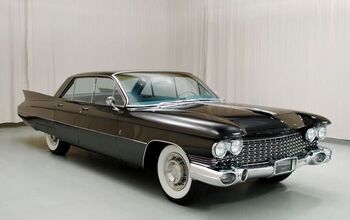Will Chrysler Sell Its California "Retail Laboratory"?
I missed the latest twist in Chrysler’s California dealer drama when I was traveling in Iowa last week, but because it’s such a significant story (and because Ford recently proved how expensive dealer drama can be), we’ll commit the cardinal rule of blogging and take a look at some week-old “news.” California’s DMV won’t report the findings of its investigation into Chrysler’s allegedly non-compliant “company store” until September 29, but the Detroit News has reported that “about 75 percent” of these dealer complaint cases end in settlement and that
Chrysler Group LLC may be on the verge of selling its company-owned flagship dealership in Los Angeles to a private retailer, which could appease angry franchise dealers in California.
So much for ChryCo leaving the state in an angry huff. In fact, angry is about the last thing CEO Sergio Marchionne sounds about the whole thing…
Chrysler Group LLC CEO Sergio Marchionne said he is not worried about the fate of the prize dealership he hopes will jump-start sales in California, where Chrysler has 6 percent market share compared with almost 10 percent nationwide. In Los Angeles, Chrysler has about 2 percent.
“It is solvable,” Marchionne said this week. “It will all go away.”
Which is an interesting response given that the Motor Village situation seems to be just the tip of the iceberg. Chrysler is making a much wider effort to turn around its underperforming California retail network, and Motor Village is simply the most egregious case since Chrysler owns the entire dealership outright. That, in itself, won’t be hard to solve, as Troy, MI-based Suburban Collection will simply buy the store instead of operating it on a trial basis for a year first, as it had planned to. A Suburban exec says a decision will be made to sell to his firm or another “in the next few weeks,” calling the situation “a ticking time bomb relative to timing.”
But what of the “California Superstores” network, where Chrysler Real Estate is also buying prime location and offering low-cost rent to a favored operator? The California New Car Dealer Association had Motor Village dead to rights with a thoroughly convincing complaint, but California Superstores could be a tougher nut to crack. But if the CNCDA is motivated by a desire for “fair competition,” it’s probably just a matter of time before California Superstores gets attacked for its cozy low-rent deal with Chrysler Real Estate. Chrysler knows it’s lost the first battle, but it will fight back if its California dealers press home their advantage by going after the Superstores network. The war is only just beginning…
More by Edward Niedermeyer
Latest Car Reviews
Read moreLatest Product Reviews
Read moreRecent Comments
- W Conrad I'm not afraid of them, but they aren't needed for everyone or everywhere. Long haul and highway driving sure, but in the city, nope.
- Jalop1991 In a manner similar to PHEV being the correct answer, I declare RPVs to be the correct answer here.We're doing it with certain aircraft; why not with cars on the ground, using hardware and tools like Telsa's "FSD" or GM's "SuperCruise" as the base?Take the local Uber driver out of the car, and put him in a professional centralized environment from where he drives me around. The system and the individual car can have awareness as well as gates, but he's responsible for the driving.Put the tech into my car, and let me buy it as needed. I need someone else to drive me home; hit the button and voila, I've hired a driver for the moment. I don't want to drive 11 hours to my vacation spot; hire the remote pilot for that. When I get there, I have my car and he's still at his normal location, piloting cars for other people.The system would allow for driver rest period, like what's required for truckers, so I might end up with multiple people driving me to the coast. I don't care. And they don't have to be physically with me, therefore they can be way cheaper.Charge taxi-type per-mile rates. For long drives, offer per-trip rates. Offer subscriptions, including miles/hours. Whatever.(And for grins, dress the remote pilots all as Johnnie.)Start this out with big rigs. Take the trucker away from the long haul driving, and let him be there for emergencies and the short haul parts of the trip.And in a manner similar to PHEVs being discredited, I fully expect to be razzed for this brilliant idea (not unlike how Alan Kay wasn't recognized until many many years later for his Dynabook vision).
- B-BodyBuick84 Not afraid of AV's as I highly doubt they will ever be %100 viable for our roads. Stop-and-go downtown city or rush hour highway traffic? I can see that, but otherwise there's simply too many variables. Bad weather conditions, faded road lines or markings, reflective surfaces with glare, etc. There's also the issue of cultural norms. About a decade ago there was actually an online test called 'The Morality Machine' one could do online where you were in control of an AV and choose what action to take when a crash was inevitable. I think something like 2.5 million people across the world participated? For example, do you hit and most likely kill the elderly couple strolling across the crosswalk or crash the vehicle into a cement barrier and almost certainly cause the death of the vehicle occupants? What if it's a parent and child? In N. America 98% of people choose to hit the elderly couple and save themselves while in Asia, the exact opposite happened where 98% choose to hit the parent and child. Why? Cultural differences. Asia puts a lot of emphasis on respecting their elderly while N. America has a culture of 'save/ protect the children'. Are these AV's going to respect that culture? Is a VW Jetta or Buick Envision AV going to have different programming depending on whether it's sold in Canada or Taiwan? how's that going to effect legislation and legal battles when a crash inevitibly does happen? These are the true barriers to mass AV adoption, and in the 10 years since that test came out, there has been zero answers or progress on this matter. So no, I'm not afraid of AV's simply because with the exception of a few specific situations, most avenues are going to prove to be a dead-end for automakers.
- Mike Bradley Autonomous cars were developed in Silicon Valley. For new products there, the standard business plan is to put a barely-functioning product on the market right away and wait for the early-adopter customers to find the flaws. That's exactly what's happened. Detroit's plan is pretty much the opposite, but Detroit isn't developing this product. That's why dealers, for instance, haven't been trained in the cars.
- Dartman https://apnews.com/article/artificial-intelligence-fighter-jets-air-force-6a1100c96a73ca9b7f41cbd6a2753fdaAutonomous/Ai is here now. The question is implementation and acceptance.

































Comments
Join the conversation
I smirk every time I see that commercial for the "Imported From Detroit" Chrysler 300; which would likely be a mediocre car if not for the "imported from Germany" components from the W210 Mercedes E Class and W220 Mercedes S Class, during Daimler's ownership of Chrysler. Not to forget the MBenz 4Matic All Wheel Drive System as well.
It seemed like they spent an awful lot of money to set up an illegal dealership. Was their plan just to wait and see if they could get away with having a retail store within such-and-such miles of legitimate franchises, or did they really not know the law? If the latter is the case, they should fire their legal team. Or maybe not, if this turns into a case of flipping the store to private dealer for more than they spent for it, which would turn out to be a smart, if bizarre, gambit.